PICKLEBALL FOR YOUR HEALTH | BE PREPARED FOR SCAMS
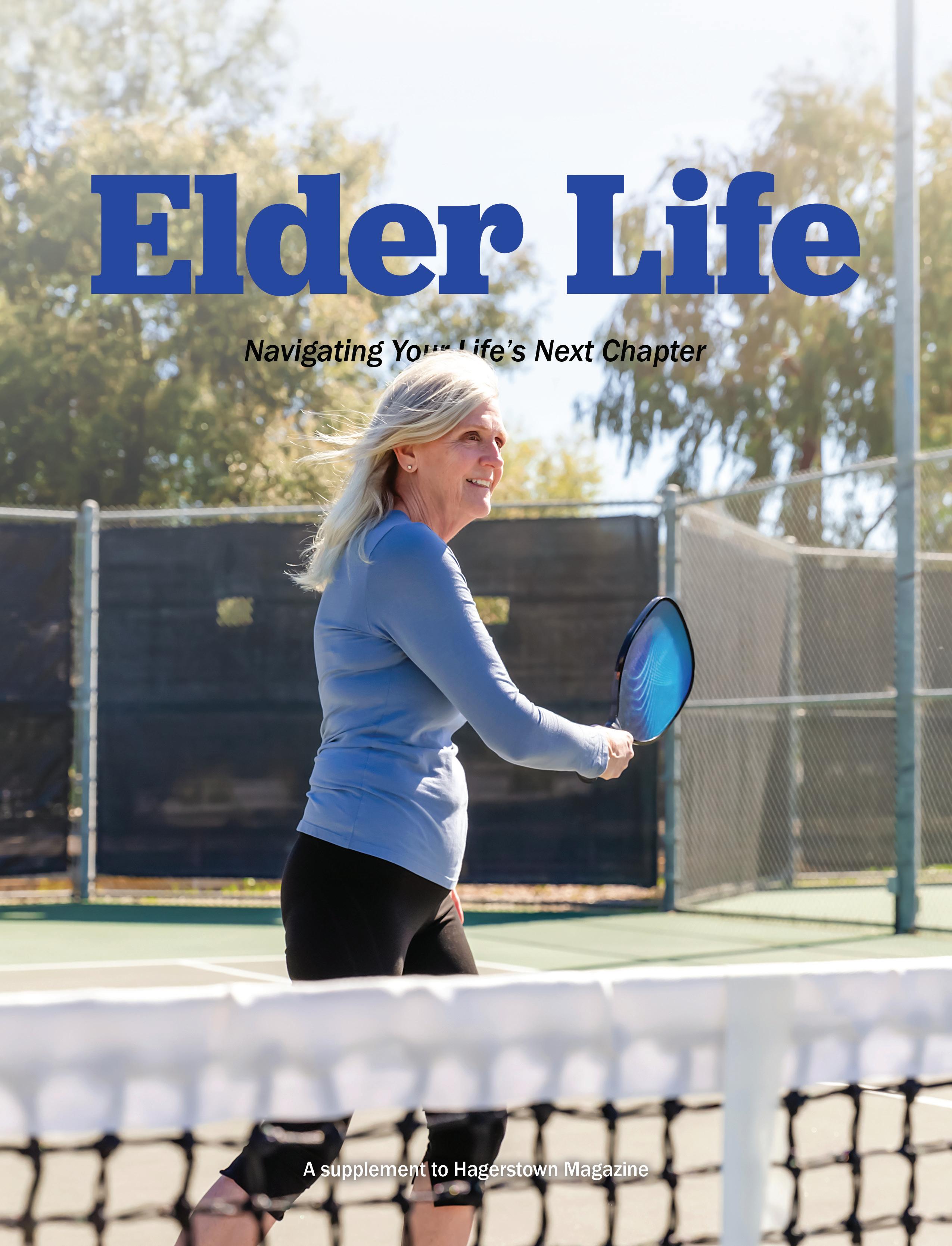










Navigating Your Life’s Next Chapter
A SUPPLEMENT TO

PUBLISHERS
Shawn Dewees
Joseph Silovich
MANAGING EDITOR
Jeff Thoreson
PRODUCTION MANAGER
Joseph Silovich
GRAPHIC DESIGNERS
Alexandra Barr Ian Sager
ACCOUNT EXECUTIVES
Chuck Boteler cboteler@hagerstownmag.com
Terri Davis tdavis@fredmag.com
Shawn Dewees sdewees@fredmag.com
DISTRIBUTOR
Josh Ensor alloutdist@aol.com
SUBSCRIPTIONS
Stephanie Dewees subcriptions@hagerstownmag.com

301-662-8171 FAX: 301-662-8399 www.hagerstownmagazine.com
Elder Life (ISSN #1555-337X), is an annual publication of Hagerstown Publishing, LLC. ©2025 by Hagerstown Publishing, LLC. All rights reserved. No part of this publication may be reproduced without the written consent of the publisher. The magazine is not responsible for unsolicited manuscripts or photographs. Subscription price: $18.87 per year which includes Elder Life. Single issues $3.71. Prices include 6% Maryland state sales tax. To subscribe, send a check or money order to the business office payable to Hagerstown Magazine, call 301-662-8171 or visit www.hagerstownmagazine.com. Periodicals Postage Paid at Frederick, MD, 21701 and at additional mailing offices. POSTMASTER: Send address changes to P.O. Box 2415, Hagerstown, MD 21741. Distributed through subscriptions, advertisers, and sold at newsstands and other locations throughout Washington County, Md., and the surrounding area.





America is getting older:
In 1960 there were 16.2 million Americans 65 years old or more. By 2060 that number is expected to be 88.8 million. In Washington County the percentage of the population aged 65 and over has increased from 14.3 percent in 2010 to 18.2 percent in 2023.

The U.S population is older today than it has ever been: Between 1980 and 2022, the median age of the population increased from 30.0 to 38.9.
One-third of states had a median age above 40 in 2022. Maryland’s median age was 39.8.
The median age in Washington County is 40.7. Maine (44.8) and New Hampshire (43.3) are at the top of the list.
Older adults are working longer: By 2022, 24 percent of men and about 15 percent of women ages 65 and older were in the labor force. These levels are projected to rise further by 2032, to 25 percent for men and 17 percent for women.
Home care remains more cost-effective than nursing homes:
Average nursing home care costs range from $104,000 to $116,000 per year vs. $69,000 to $75,000 per year for home health services, according to americashealthrankings. org. About one in six Western Maryland residents (42,000 of 252,000) are enrolled in
Medicaid community-based services, so home care plays a significant role in the region.
Projections indicate minimal growth in local home care workforce:
The risk of under-service in care for our aging population appears to be quite real. Nearly all nursing homes (99 percent) and assisted living facilities (96 percent) report workforce shortages, according to marylandmatters.org.

Long-term service and support:
More than 42,000 Maryland residents receive long-term service, and support in the community via Medicaid, i.e. through home and community-based care, according to health.maryland.gov. This covers services like home health aides, personal care attendants, nursing, and more.



Our physical capabilities fade as we age, but pickleball seems to be the remedy many are turning to
By Charles Jeffries
When my son moved back from California last fall, he introduced me to pickleball. It’s not that I didn’t know about the sport, but I thought it was too the 2020s what the Hula-Hoop had been to the 1960s. I told him I’d give it a try anyway.
Alex took me to Marty Snook Park one afternoon when no one was around and showed me how to dink. As an athlete whose tastes in his younger days ran more toward sports that involved collisions, or at least participants moving at a very fast pace, this dinking seemed like nonsense.
“OK, this is fun,” I told him in a tone laced with sarcasm. He convinced me to continue.
Live Longer: A study in the International Journal of Research in Exercise Physiology found pickleball a feasible alternative to traditional exercise for older adults. Regular participation improves cardiorespiratory fitness and moderates key cardiovascular disease risk factors like blood pressure and cholesterol.
Perk Up: Any exercise is a proven mood booster, and pickleball is no exception. An article in Leisure Studies reported that older adults who played pickleball had a lower risk of depression.
Just Give it a Try: Many older adults start playing pickleball because a friend or partner suggested they join them. Often skeptical, these people more often than not end up enjoying the game enough to come back for more.
Make Friends: Pickleball is a great social outlet. And that desire to connect with friends helps improve your overall mental status.
Avoid Assisted Living: Older adults who play pickleball regularly may improve their reflexes and balance, which can help them live independently for longer.

We moved on to the drop shot (only slightly more exciting). Then the serve; under-handed and with a little pace, but still humdrum as physical activity goes.
“Think of the serving motion like cornhole. You’re good at cornhole,” he said, trying to hold my interest. I am good at cornhole, but I don’t consider it a sport. It’s a way to pass time while having a beer at a picnic or family gathering.
OK, so pickleball may not be the Hula-Hoop, but so far it’s not much more than cornhole.
Alex explained the kitchen. Well, that seems silly. Then he told me the return serve must bounce before it can be hit back, which seemed to me to eliminate the advantage of having the serve. So, at this point it seemed to me we are basically paddling a Whiffle ball back and forth over a net. Exciting.
“That’s where strategy comes in,” he said. “Remember this: third shot drop shot. If you can drop the third shot into the kitchen they’ll have to dink it back over the net.”
Oh, great, the dink shot again. “Why wouldn’t the opponent just rush the net and slam it back?”
“Don’t you remember what I told you about the kitchen? You can only go in there if the ball bounces first. Think of the kitchen as out of bounds.”
“But it’s in the middle of the court. How can it be out of bounds?”
Clearly frustrated with me, he simply said, “You’ll see.”
I hung with him and got the hang of the serve and the volley, but the dink simply didn’t suit my athletic taste. I could do it once or twice, but I was always anxious to hit the ball hard, which usually resulted in it sailing out of bounds because the court is so damn small.
I told him pickleball was silly—a game designed to neutralize athletic ability, and therefore an activity for folks of the three O’s persuasion—old, overweight, and out of shape. I fit only the old category. I long to go back to playing basketball, the game I played through high school, college, and well into my 40s before a medical issue forced me into retirement.
My son told me we’d come back in the evening and play when others were on the courts. In the twilight of a fall evening, the lights illuminating the courts at Marty Snook, I had my official introduction to pickleball. And I loved it.
Everything together, the serve, the volley, the dropshot, the strategy, the slam (still my favorite part of the game)—even the dink— captivated me the way basketball had done in my younger years. As a senior somewhat limited in what my exercise regime can include, pickleball renewed my athletic interest. The court is small enough that you only have to
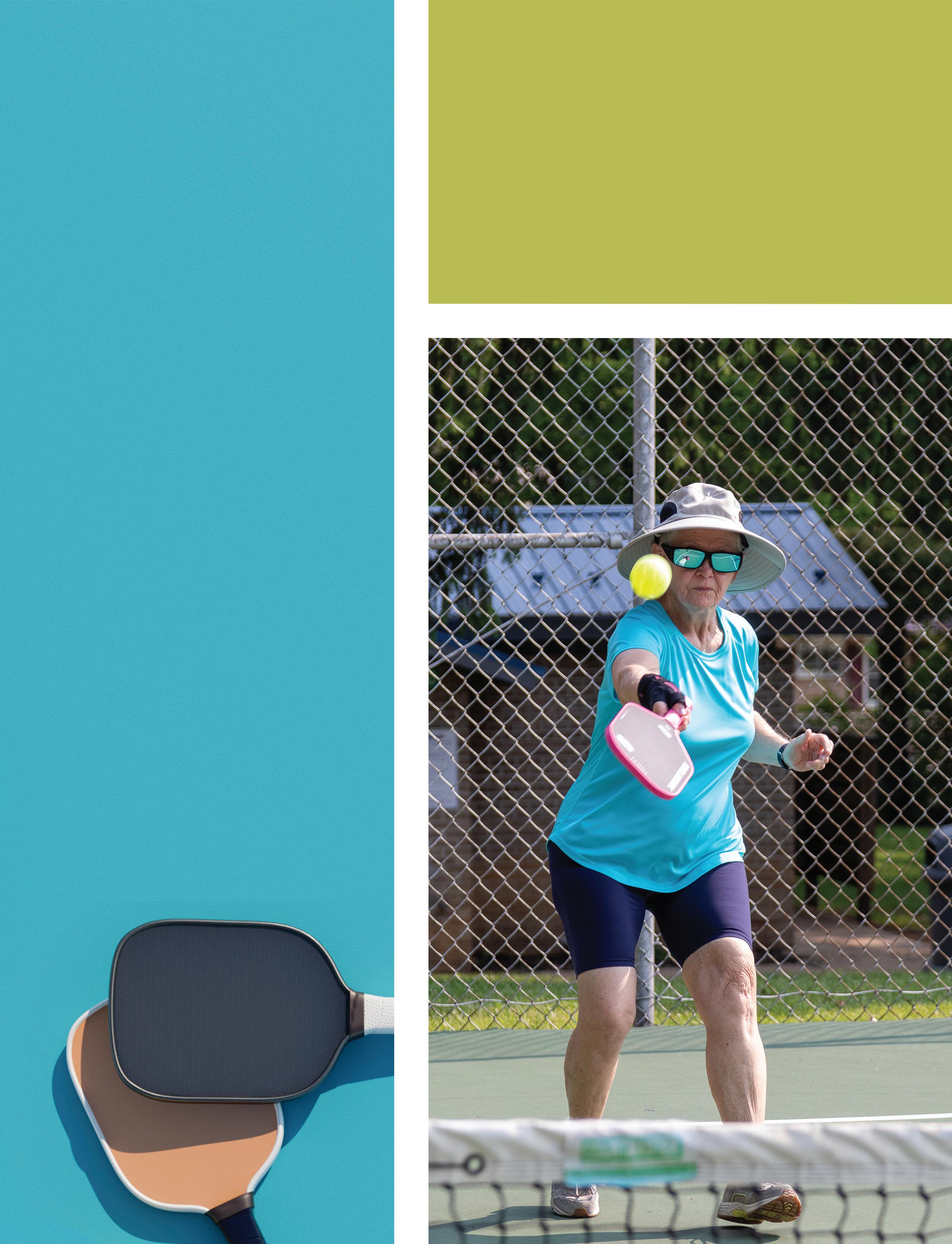
run a few steps at a time, and in the proper position with the correct strategy, the game can be well executed from a nearly stationary position. I play two to four times a week, which still leaves plenty of time for golf and all the other semi-retirement things I enjoy.
In the beginning, pickleball is a frustrating game for an athlete. It took me a month to keep from smashing the return serve back without letting it bounce. It took another few weeks to keep my momentum from carrying me into the kitchen.
Once, before I understood this rule, I was moving toward the net and my opponent’s soft lob of a volley was floating there like an eephus pitch. I moved faster, kept my feet behind the kitchen line
and slammed it back, only to be told it was an illegal shot because my momentum carried me into the kitchen. I was enraged—stupid game, stupid rules.
When a wide receiver catches a pass, taps his feet in bounds, and his momentum carries him out of bounds, it’s still a catch. When I used to shoot three-pointers they counted three points even if my momentum carried me across the arc. But, no. In pickleball that kind of display of athletic ability can’t be tolerated.
It took me months to accept that pickleball is an activity, not a sport—much like my other favorite pastime of golf. I created ways to adapt, like realizing maybe it’s called the kitchen in honor of our mothers and their constant demand: “STAY OUT OF THE KITCHEN.” And understanding that pickleball needs to be played at 80 percent because the Whiffle ball doesn’t move as quickly as a baseball or tennis ball.
My gradual understanding and acceptance of these non-athletic pickleball principles brought me to the proper understanding of the game. Pickleball is not a sport, but it’s also not the Hula-Hoop or cornhole—it’s better. The game challenges seniors to stay in shape and have fun while mingling with folks of similar age and background—and if you get good enough (I did) you can beat people a lot younger than you.
It’s far from a physically taxing sport (occasionally I break a sweat), but it burns calories. I’ve lost 15 pounds since I started playing, and I feel like I’m in the best shape since my basketball days. Yeah, my knees, Achilles tendons, and, as a southpaw, my left elbow and shoulder ache the morning after I play, but it’s a good ache; a rewarding ache that comes not from aging, as so many pains do, but from fighting off aging.
Pickleball? I’m all in. Thanks, Alex.

Cindy Pope (previous page) and Kim
Needy team up for a game of pickleball at Marty Snook Park.
There are dedicated pickleball courts and tennis courts with pickleball lines throughout Hagerstown and Washington County. Although the height of a pickleball net is a little lower than a tennis net, these makeshift courts can be a good introduction to the game. There are also dedicated courts at places like the Hagerstown Field House and the YMCA.
Camp Harding Park
13029 Pectonville Road, Pectonville
Chestnut Grove Park
3106 Chestnut Grove Road, Keedysville
Clear Spring Park
12424 Big Spring Road, Clear Spring
Doub’s Wood Park
1307 South Potomac Street
Fort Richie Community Center
14421 Lake Royer Drive, Highfield-Cascade
Hagerstown City Park City Park Drive, Hagerstown
Hagerstown Field House 290 East Memorial Boulevard, Hagerstown
Leitersburg Ruritan Recreation Center 21427 Leiters Street, Hagerstown
Marty Snook Park
17901 Halfway Boulevard, Hagerstown
Pleasant Valley Park 3199 Gapland Road, Gapland
Tammany Park
16700 Tammany Manor Road, Williamsport
Washington County Regional Park
20245 Mt. Aetna Road, Hagerstown
YMCA
1100 Eastern Boulevard, Hagerstown


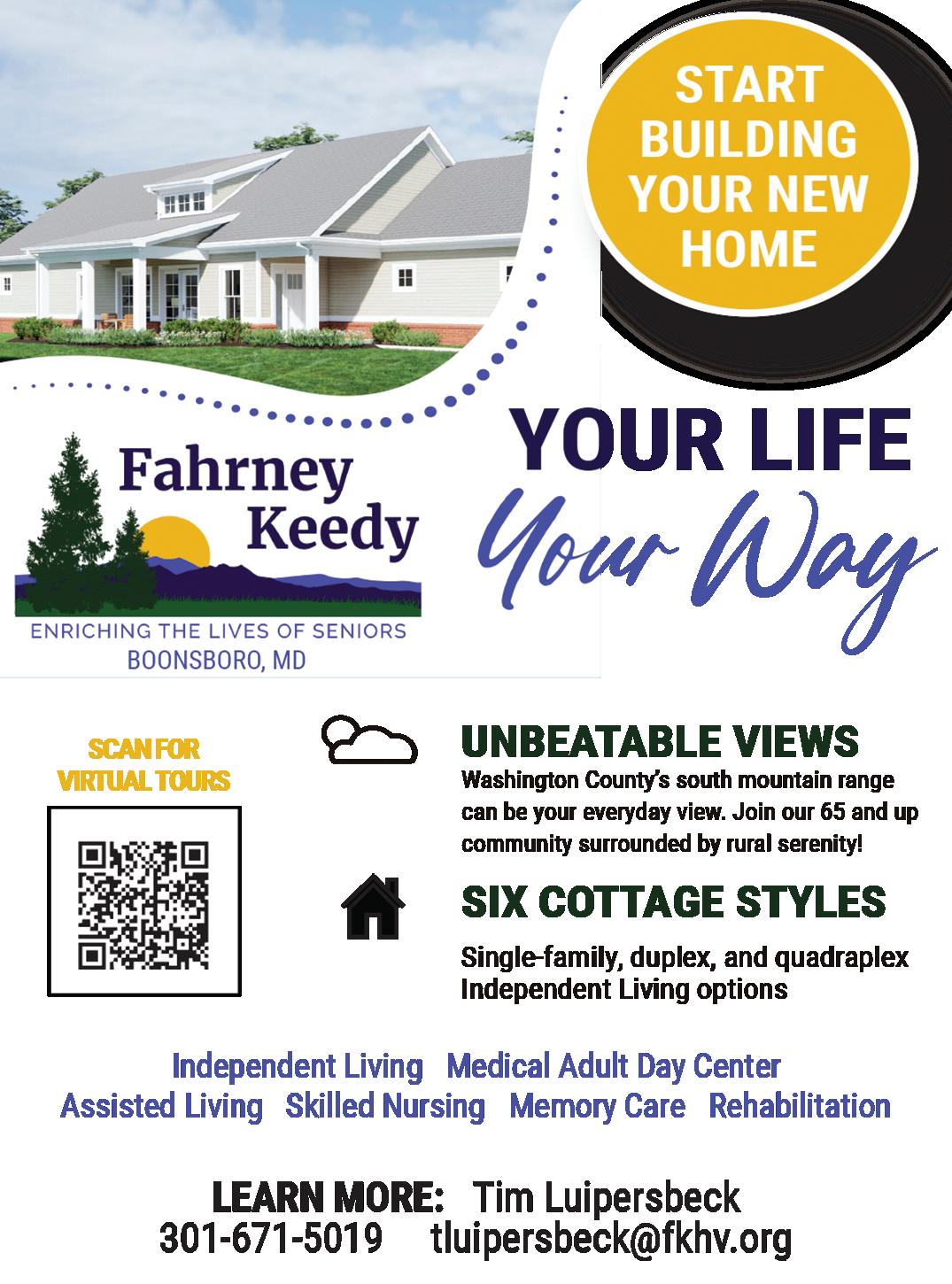
Protect your assets and rights by having the proper paperwork legally completed

BY LAURA FORREST HOPFAUF
Life is full of paperwork and surprises. No one can plan for all the surprises, but we can all take a step toward planning for the paperwork. As a senior, the legal process of getting your papers in order can give you peace of mind while saving your loved ones from worry and stress in the future. Although it can sound intimidating, having your legal documents drawn up by a lawyer doesn’t have to be a scary, expensive, or a time-consuming affair.
The legal documentation that seniors need or want can depend on the individual goals for their legacy, but the three documents that are necessary are a last will and testament, a financial power of attorney, and a medical power of attorney and/or a medical directive.
A last will and testament is perhaps the most familiar document and directs what should happen with an individual’s estate and assets upon their death. A financial power of attorney empowers an appointed individual to manage another’s finances. A medical power of attorney designates a particular person to make decisions about another’s medical care while a medical directive describes a person’s wishes for their own medical care if they can no longer make decisions for themselves.
Jake Polivka, an attorney at HWL Law Group with an office in Hagerstown, says, “It always depends on the situation, but by and large this [a power of attorney] is the most important document


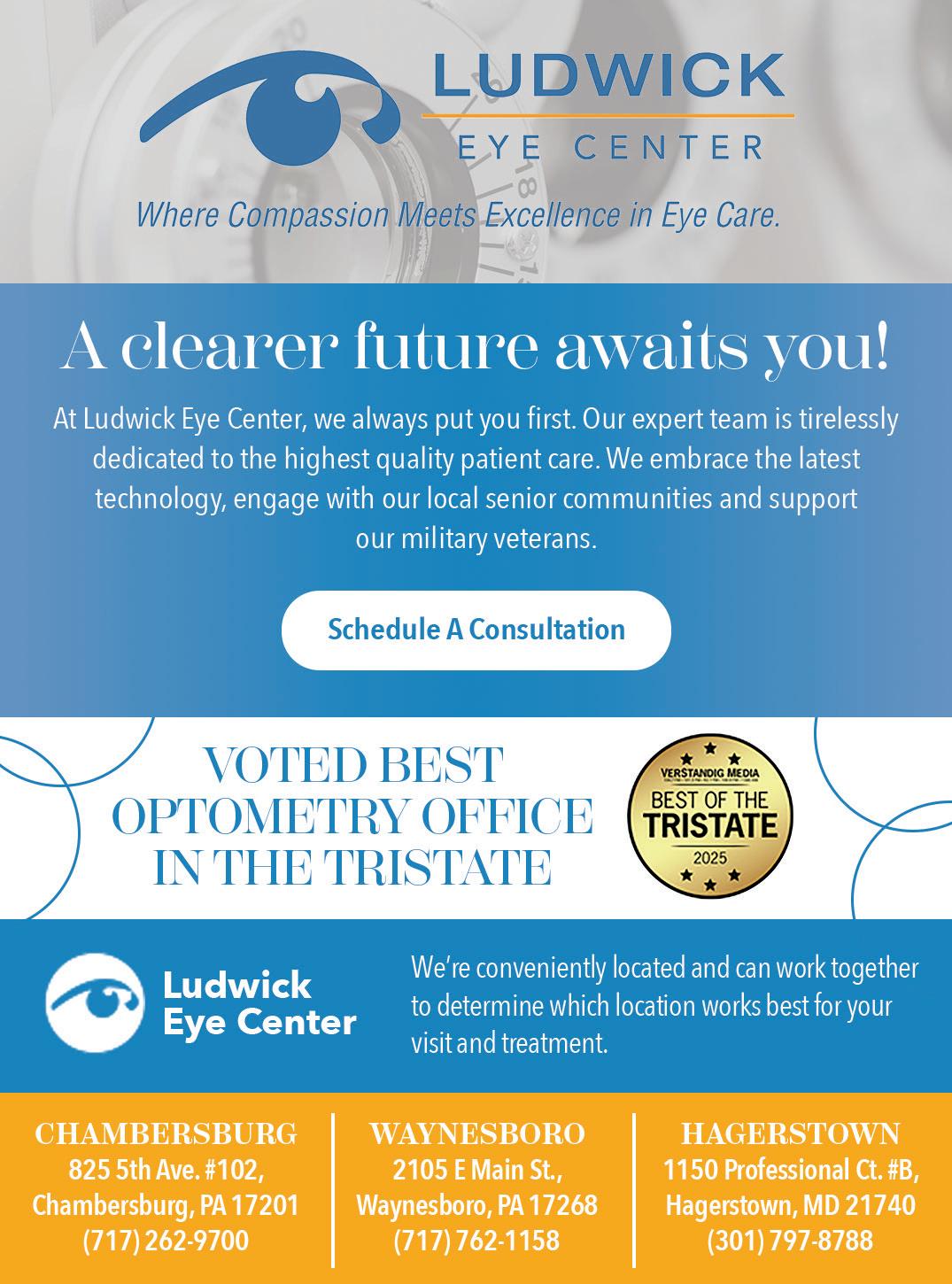

most cases. The reason is that there is no one who automatically has legal authority to apply for Medicaid or a long-term care facility on your behalf, sign your documents, access your money, sell your assists, file your taxes, etc. if you become legally unable to do these things because of mental decline.”
It’s not a part of life that anyone willingly wants to think about, but working with an attorney can help ease that burden while protecting you, your assets, and your family in the future.
“Many people will say that bad blood over inheritance would never happen in their family. But the reality is that things change after you’re gone, and your spouse or kids may all have different recollections of what you said you wanted,”
Polivka says. “The only way they will know for sure is if you write it down in a way that makes sure your wishes are followed. Taking time to plan out your instructions is also a great way to show your loved ones that you care, even after you can’t tell them anymore.”
In conjunction with letting loved ones know what you want, this documentation can help a senior maintain control over their lives even when they might not be able to exert that control themselves anymore.
“If a person dies without a will, there is a statue that deter-
mines what will happen with a person’s estate but it may not be what the individual wants,” says Ashley Wilburn, founder and attorney at Wilburn Law in downtown Hagerstown.
“If a person is having a medical issue or condition, but does not have a medical power of attorney, then there is a statue that allows medical practitioners to see direction from family members, but again, it may not be the person that the individual wishes to be in charge.”
Seniors don’t need to have everything in order or know exactly what they want going into these meetings. Bringing statements for financial accounts, documents on mortgages, the contact information and legal names of the people you want on your power of attorneys and wills, and your questions are generally what is needed to start the process.
Polivka adds that it’s okay to bring any documents you aren’t sure about if you’re seeing a lawyer as they can help determine if they are necessary. Wilburn insists not to be afraid to ask questions.
“Estate planning is not as scary as it might seem,” Polivka says. “Many people hesitate to make these plans for themselves, and there are a lot of reasons for that. But really, the benefit you get is discussing your goals for your legacy with a professional who knows the right tools to use to accomplish them. That way, you get to talk about the inevitable at your lawyer’s office, but you can leave that burden with your attorney when you go home.”
For those worried about the price of having these documents drawn up, Wilburn says, “These three basic documents should not cost you multiple thousands dollars. They are generally not very expensive.”
As far as when to get your legal paperwork in order, there is no set time or event that dictates when to start the process. Instead, wherever you are is the perfect place to start.
Wilburn adds, “Everyone should have these documents executed regardless of age. Generally, people wait too long to have them executed. Things happen that you do not expect.”



At a recent giveaway event through Senior Services Network, founder Paul Brown noticed something unusual. He had thousands of pounds in food and household supplies to give away, and he was eager to get it into the hands of people who needed it most. Yet, multiple people told him they felt guilty taking the food, even though it was a much-needed provision.
It’s not easy to ask for help. Many people carry with them a stigma instilled since childhood that asking for help is shameful. Others may not be aware that help is available or even know where to look for the help they need.
Paul Brown has seen all of these predicaments. That’s why he founded the Senior Services Network, where the mission is “to connect seniors to the services they require for independent living using our extensive network.”
SSN particularly seeks to help those who fall into a category called the ALICE threshold, which stands for Asset Limited, Income Constrained, Employed. The term describes people who fit into a tricky category of earning above the federal poverty level but below what is needed for a quality standard of living.
The statistics for Washington County are revealing, and Brown cites the 2022 census to reveal just how many fall into

this criteria. The 2022 census found that of the 28,000 Washington County residents over the age of 65, nine percent are living in poverty and 46 percent fall into the ALICE threshold.
Or to put it another way, the federal poverty line is $15,650 for a one-income home, but the living wage required to meet basic living expenses is about $42,000. Those caught in the middle make too much money to qualify for
By Erin Jones
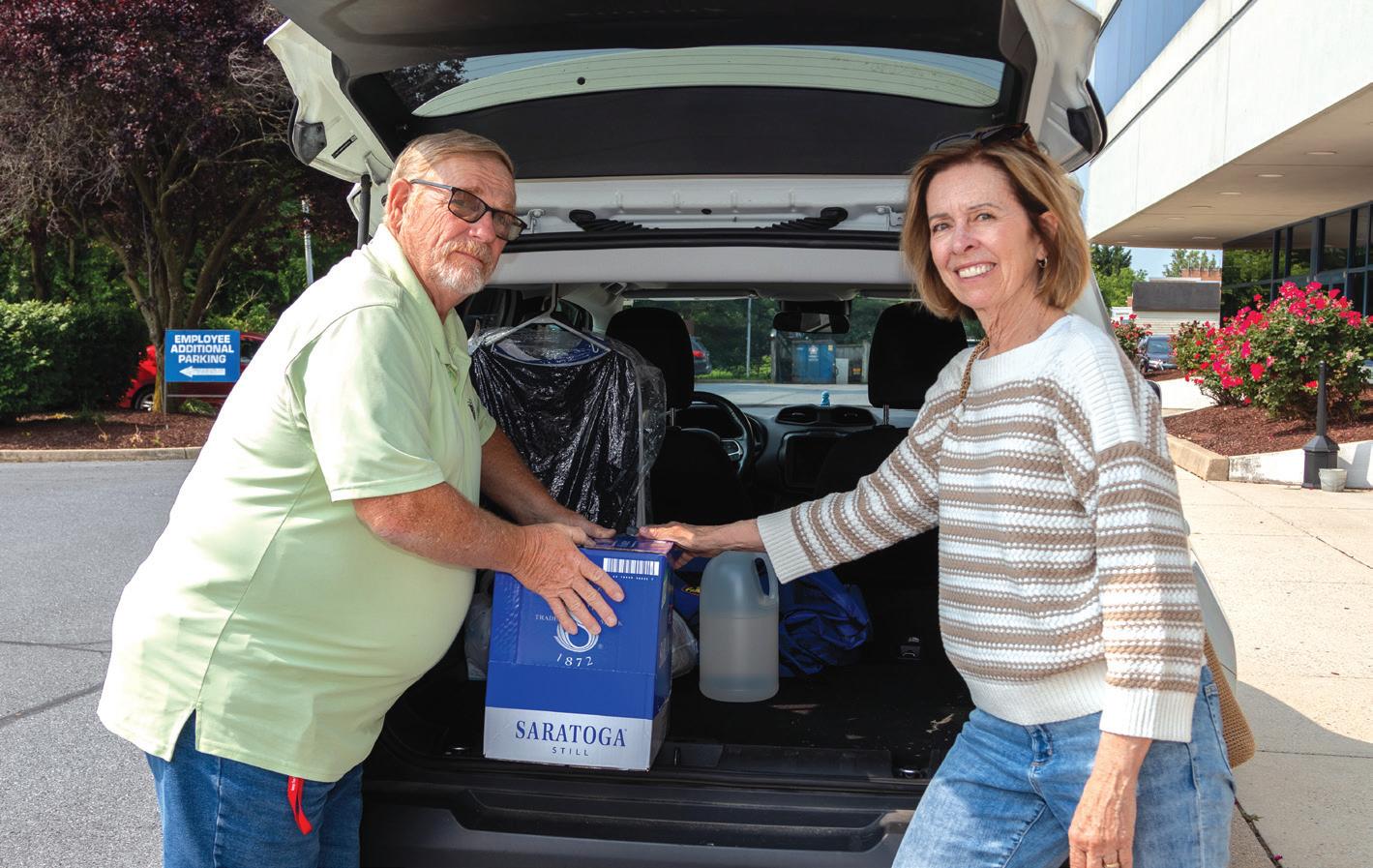
many low-income benefits but not enough to keep up with the cost of living in Washington County. Paul Brown created SSN to help folks bridge that gap.
A native of Hagerstown, Brown joined the AirForce at 17. After spending several decades in Ohio, he returned to Hagerstown in 2013. Before retiring, he worked as county coordinator for the Special Olympics in Ohio and an accountant for the Arc of Washington County, which provides support to adults and children with intellectual or developmental disabilities.
His heart to help people did not go away after his retirement. His wife, Ruth Ward, came home from volunteering at the senior center and mentioned to him how many elderly individuals need help with simple tasks like cleaning gutters or changing

a fan.
In 2018 he started a business to meet this need, calling himself the $25 guy. The model was simple. He would do whatever needed to be done for $25 an hour. There would be no upcharge or hidden fees, because the cost was in the name.
“I called myself the $25 guy because I wanted seniors to know that I’m not expensive,” he says.
Business took off, and as he spent more time with seniors who needed his help, he noticed another need: there were very few programs available for people in the ALICE threshold.
“These are individuals who have assets, but they may have just a house or they may have some savings or some retirement money in the IRA. That’s ‘asset limited.’ Their income constraint is they live on social security or on their retirement and maybe a part time job. They were either employed somewhere, most of their life or they’re still employed part-time.” Brown says.
Someone living in the ALICE threshold may feel their finances are tight, but not precarious. Then when an unexpected expense arises like a car repair or an appliance that needs to be replaced, they are left scrambling to come up with the money and facing difficult financial decisions.
“Those are the people that I set up the organization to help,” Brown says. “There are resources out there, but they’re limited. There are programs out there, but they’re limited. So, to be able to help navigate those seniors towards some of those programs, that’s what I aim to do.”
Senior Services Network became a 503(c) in June 2024, and is still growing into the vision Brown has for the non-profit.
Some resources SSN provides directly. For example, Brown acquired a contract with Amazon, which donates food and household items. The first shipment was 7,000 pounds of food and supplies and the second was 9,000 pounds. SSN initially had a giveaway from its Hagerstown office space, but found
it was more effective to bring it into a more accessible space.
Summerland Manor began hosting the giveaway in its community room. More than 200 people came to get food and supplies the next month, and Brown received letters of gratitude from people who were helped.
SSN has also launched a transportation program, utilizing vetted volunteer drivers to provide door-to-door service, to go to the grocery store, the doctor’s office, or anywhere they need to go. The cost of the ride is a pay-what-youwill donation.
SSN also offers education and advocacy. A recent seminar included a talk on how to use an iPhone, navigating apps and the technology involved.
As the volunteer force grows, Brown would like to create a Senior Safety Patrol that will help with situations like busy street crossings and parking garage security.
In addition to providing resources directly, SSN provides a network of expertise.
“We can’t offer services ourselves for all the things that individuals need, but I know somebody who knows somebody who knows somebody.” Brown says. “We’ll get you the answer. We’ll get you some information. We’ll do what we can to hook you up with those services.”
Brown hopes to expand SSN, both in its offerings, its volunteer base, and the network of people who can offer referrals. When he encounters the barrier of shame associated with asking for help, his message is clear, “At some point in time in your life, you need help. We’re here to help you.”
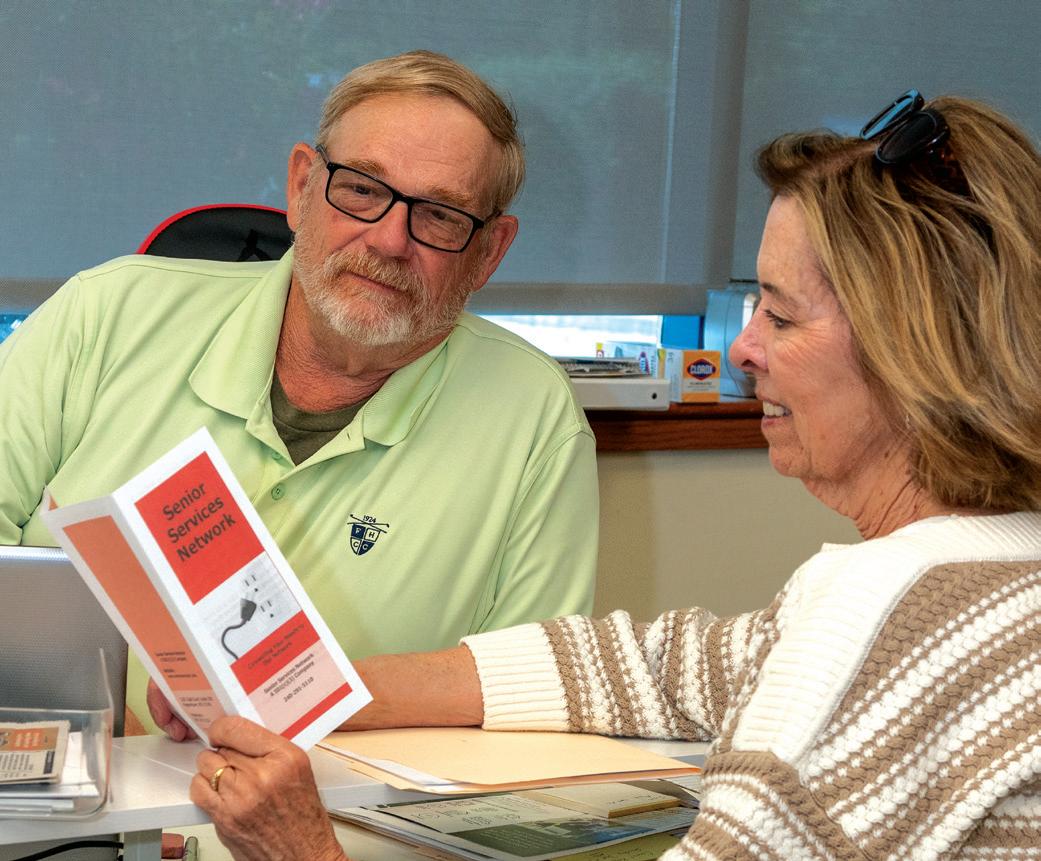
SSN will be hosting a fundraiser in partnership with Sloan School of Music on September 20, at Meritus Park. If you need help or would like to be of help, get in touch with the Senior Services Network at www.seniorsvcsnet.com.


By Laura Forrest Hopfauf
Our elder years shouldn’t be lonely, and retirement should be a time of life that is fun, exciting, and social.
But after losing the schedule and friends that went along with a career, what initially feels like freedom can become bleak and depressing, especially if you’re faced with empty days alone at home.
As the heart and soul of the local elder community, the Washington County Senior Center helps the 55-and-over sect avoid such pitfalls of retirement. The modern facility on East Franklin Street in Hagerstown provides a safe space for seniors to congregate and offers an array of programs and activities. The facility also provides a gym known as Senior Fit and a quarter-mile walking loop around the property.
“Staying at home alone is not the best option if you can come to the senior center and take part in many wonderful classes and meet equally wonderful people. It enriches your life at a time when others retire from life,” says Patty Apostolides, who has been a member for two years.
Members of the senior center are able to participate in classes and activities that range from guitar instruction to conversational Spanish, Tai Chi to chair yoga, and knitting to watercolors for free or at a nominal fee. There is such a variety of classes that all county seniors can find something that lights them up with passion.
“The resources here are phenomenal,” says Pam Wassam, a member of the senior center.
“We’ve actually had new retirees come in and say they are


bored,” says Abby Housel, senior activities center program manager. “Retirement shouldn’t be a time when you have nothing to do. The senior center is here to help you flourish, whether it’s by continuing activity of past interest or trying something new.”
At its heart the senior center isn’t just about what you can do, it’s about who you meet and who it allows you to become in your golden years. At the base of all the classes, activities, and presentations is social connection, fellowship, and friendship in a community of seniors all entering the same stage of life and looking to continue to grow.
“Everyone is friendly, and I’ve made many friends as a result,” Apostolides says. “It is wonderful to come here and spend time with them.”
Whether you’re interested in strength training, learning to draw, speaking Spanish, square dancing, cornhole, or even wanting to volunteer your time to teach a program, the senior center has a place for you and wants to welcome you into the elder community in Washington County that is alive and thriving so that you can continue to flourish well into your golden years.
“Many of our members are now living a healthier lifestyle due to


the classes they’ve participated in here,” Housel says.
Being part of this community is a way to keep your spirit alive, your body healthy, and your mind active in retirement when being at home alone may make you feel like you have nothing to do.
“It changed my life. It can change yours,” Wassam says. “It will open doors that you can’t imagine when you’re just sitting at home with nothing to do.”
The senior center provides a welcoming environment for people in the community who are 55 plus to engage in programs that cover a wide variety of interests.
“Participation reduces isolation, which in turn promotes the mental health of our community members, especially those who don’t have strong social connections nearby,” says Housel.
Outside of the regularly scheduled activities, the senior
Where: 535 East Franklin Street, Hagerstown
When: 9 a.m. to 3:30 p.m. Monday through Friday
Membership: Joining the senior center is free and open to independent adults over the age of 55. Becoming a member is as easy as stopping in to complete a registration form or downloading the application online from their website and bringing it completed to the center along with a photo ID.
Also: The facility has a fitness center known as Senior Fit and a quarter-mile walking loop around the property.
center also hosts outdoor concerts that are sometimes accompanied by a food or ice cream truck, guest speakers, health presentations, and history talks along with wellness programs run by The Washington County Commission on Aging.
“We are always looking to add new programs to our calendar and seek community members who would like to volunteer their time to teach a program,” says Housel.
No matter what your interests are, the senior
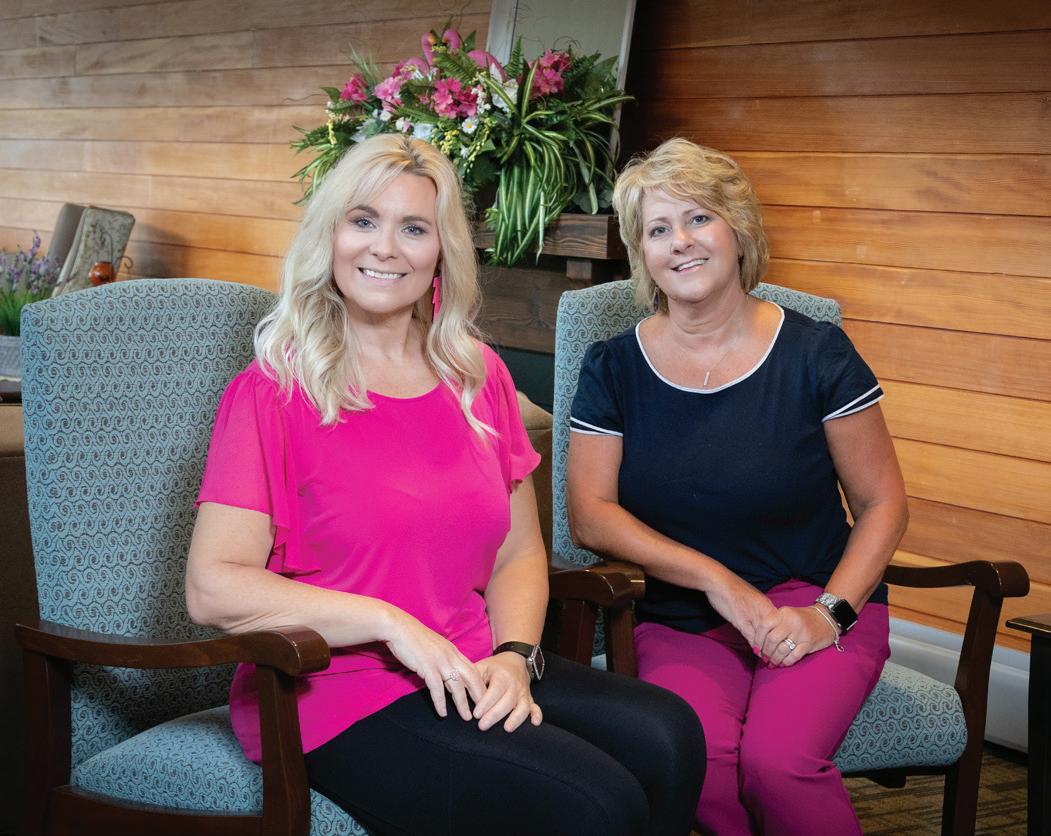
center will have something for you to do or something new for you to try.
“It’s a great community of members that bring their experiences, talents, and love to share with others,” says Apostolides. “I am blessed that we have it in our community.”
“As a Seniors Real Estate Specialist, I’m passionate about helping older adults and their families navigate housing transitions with care, clarity, and confidence. I provide personalized real estate guidance and coordinate with other senior-focused resources to create a seamless and supportive experience every step of the way.”



By April Bartel
As Washington County’s baby-boomers and leading-edge Gen-Xers advance into retirement, community support for seniors and their families is taking center stage. One local nonprofit is making a difference for those navigating the challenges of aging, illness, and caregiving.
Washington County CARES, Inc., a 501(c)(3) organization founded in 2002, offers a lifeline to those providing care to loved ones with dementia, Alzheimer’s, or disabilities. The heart of their mission is a belief that supporting caregivers, most of whom are unpaid family members, is essential to sustaining the well-being of the entire community.
More than 48 million Americans are unpaid caregivers, according to AARP. These individuals, often adult children or spouses, dedicate countless hours to supporting loved ones at home, frequently without formal training or adequate financial resources. The Alzheimer’s Association notes that more than 11 million of those caregivers, nearly 25 percent, are supporting someone with Alzheimer’s disease. The emotional and physical toll is significant. Caregivers are more likely to suffer from depression, anxiety, and chronic illness. Without respite or support, they risk burnout, which ultimately impacts the person receiving care as well.
Washington County CARES recognizes this hidden crisis.
“Caregivers often become so focused on their loved ones that they neglect their own health,” says Amanda Crawford, the organization’s current president. “We give them a chance to take a breath, to care for themselves, so they can keep going.”
The organization’s primary offering is a respite care grant program. These grants help pay for temporary caregiving support, whether at home through a licensed aide, at an adult daycare, or during a stay at an assisted living facility. Recipients may require help with daily needs such as bathing and dressing, light housekeeping or cooking, transportation, or safety supervision.
There is no age restriction for the person receiving care, and the program is income-based, using current Medicaid thresholds to determine eligibility. Crawford emphasizes that the application process is flexible and compassionate.
“If someone is slightly over the income level, we still review the case. Our goal is to help those truly in need,” she says.
The grant provides something most caregivers lack: choice. Families can select the kind of respite that works best for them. In some cases, another family member can serve as the temporary caregiver, submitting a timesheet for documentation. While Washington County CARES does not directly recommend caregivers or agencies, they can offer lists of trusted local providers and community programs, such as the adult day program at Fahrney Keedy or the free,
monthly Memory Café at the Otterbein United Methodist Church in Hagerstown.
Steven Luber, CARES’ board secretary, also serves as the business development manager for Right at Home of Washington County. That company provides in-home assistance to seniors. His dual role gives him a unique perspective on the region’s growing need for caregiver support.
“We’re seeing more and more people who want to stay in their homes, but the support systems aren’t always there,” he says. “That’s where the grant makes a difference.”
Teresa Straley is part of the grant review committee. She echoes the thought, “CARES is such a vital piece of the community. It’s a group of like-minded individuals whose focus and goal are to educate the community on resources available to seniors and their families. Our members bring so much to the table with services and information, we want to streamline the process and ease some of the stress of families through events and education.”
Washington County CARES operates entirely through fundraising and donations. Members volunteer time planning events, managing applications, and spreading awareness.
Their signature annual events include a community-wide Senior Resource Fair each September, held this year at Homewood at Williamsport on September 19. The resource fair is a vital opportunity for older adults and their families to learn what help is available. It typically draws about 25 vendors, from senior living facilities and case management services to down-
Washington County CARES officers Karla Anderson, vice president, Steven Luber, secretary, Amanda Crawford, president, and Rebecca Kirby, treasurer.
Photography by Mark Youngblood

sizing experts and local nonprofits. The fair is one of the group’s biggest fundraisers, thanks to vendor fees, raffles, and direct donations. It’s also about connection.
The annual “Taste of Senior Living” gala held in August at Homewood, invites local senior community chefs to compete in a culinary showdown. Attendees judge the top appetizer, entrée, and dessert. While it’s a light-hearted event with delicious food and wine, the underlying goal is serious: to raise money for respite care grants and draw attention to the needs of caregivers. Other fundraisers include bake sales, restaurant nights, and booths at seasonal events.
This year’s grant awards have outpaced previous years, underscoring a growing need. In response, the CARES board is exploring outside grants to expand its own funding opportunities. For now, however, it remains a grassroots effort fueled by community generosity and a dedicated team.
The team itself is small but mighty, with only four board members and several more helping on subcommittees. All of them have personal reasons for being involved. Crawford’s passion stems from watching her grandmother decline after being diagnosed with dementia in her 60s. Luber’s family story is similar. His mother cared for his grandfather during a long battle with Alzheimer’s. These experiences make the mission deeply personal.
“Privately and professionally, this impacts my life, so it is something I am proud to be part of,” Luber says.
The grant application is on the organization’s website, with updates on its Facebook page. The application is straightfor-
ward and reviewed monthly. Donations are accepted online, and new volunteers or members are always welcome. CARES meets on the second Tuesday of each month at Homewood, beginning with networking at 8:30 a.m. and a formal meeting at 9 a.m.
Although they are not affiliated with any national network or government office, Washington County CARES connects with broader programs and organizations, including the Alzheimer’s Association, the local Commission on Aging, Meritus Medical Center, and Dementia Friendly Washington County to fulfill the vision of “a fully supported community of caregivers.”
The need for this kind of support is only growing. Nationally, the number of people over age 65 is expected to double by 2060. In Washington County alone, informal estimates suggest there are more than 3,000 people currently living with Alzheimer’s – a number that doesn’t include other forms of dementia or disability. Diagnosis are also happening earlier, sometimes in people as young as their early 50s.
Crawford recommends that families just beginning their caregiving journey start with the Commission on Aging to identify what resources they may need. “Sometimes just knowing where to start is half the battle,” she says.
“Education is a big part of what we do, letting people know help is there,” says Luber. “Caregiving isn’t just a senior issue, it’s a family issue, a community issue. We all benefit when we support each other.”
As the landscape of aging continues to shift, Washington County CARES stands as a compassionate, community-driven

response. By prioritizing the caregiver’s health and offering practical relief, they ensure that both caregivers and care recipients can live with dignity, balance, and hope.

To learn more, donate, or apply for a grant, visit www.washingtoncountycares.org or follow them on Facebook.


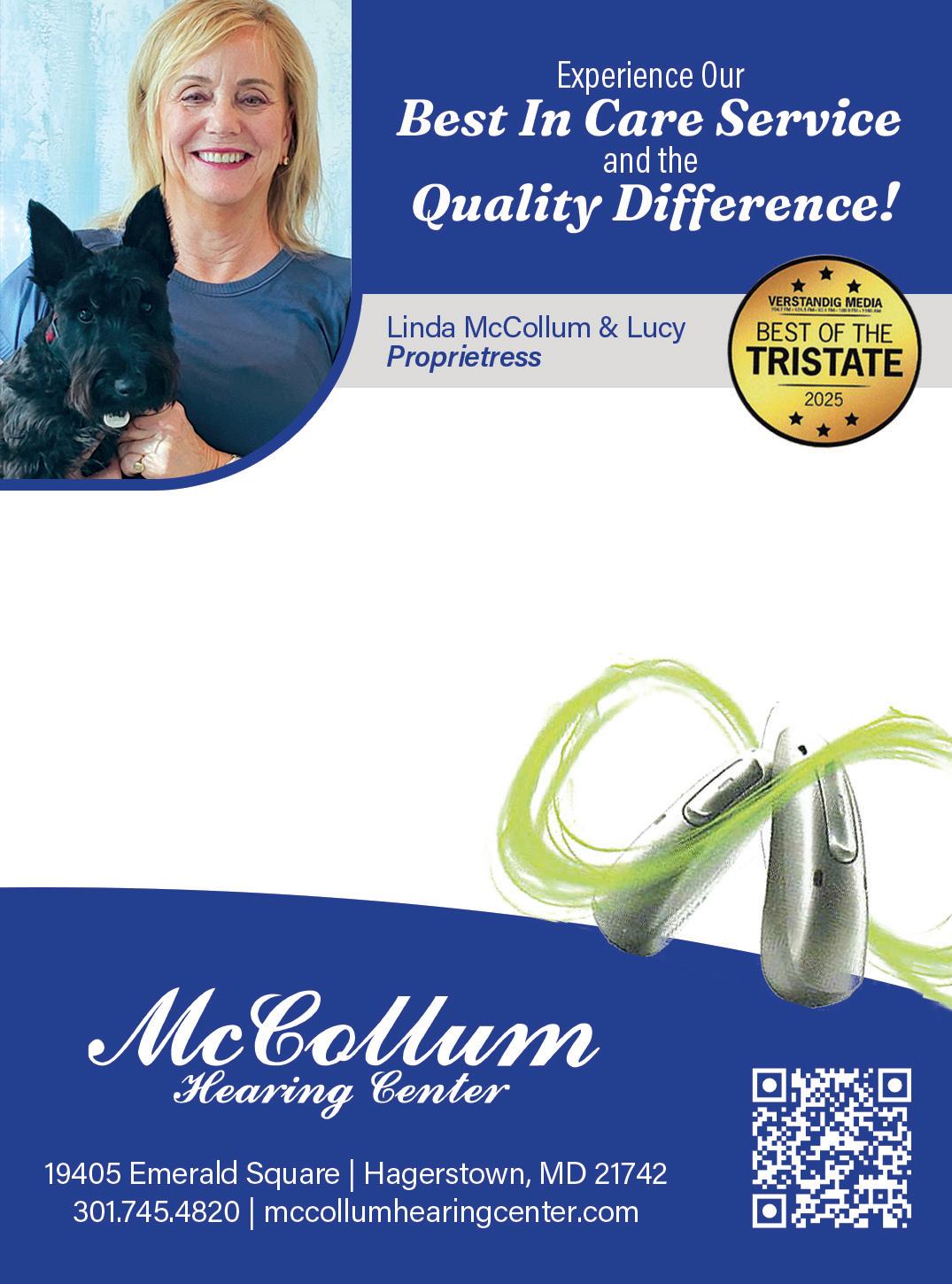
We value our clients and provide only the Very Best Quality Hearing Products & Services.
I personally invite you to call today and schedule your complimentary hearing analysis. You will understand why McCollum Hearing Center is the leading provider of quality hearing aids in the Mid-Atlantic region.

From the Washington County Commission on Aging (www.wccoaging.org)
AGING IN PLACE:
A local grant-funded program that supports seniors and those with disabilities to improve their quality of life through support measures such as education, medical device assessment, etc.
APPLICATION ASSISTANCE:
Maryland Access Point department can assist seniors and those with disabilities in completing a variety of applications. Contact the MAP department for details.
BENEFITS CHECKUP:
A secure online site that helps you find benefit programs to assist with paying for medications, health care, food, utilities, and more. You can do it yourself from home in about 15 minutes or come into the office for assistance. www.benefitscheckup.org
COMMUNITY FIRST CHOICE PROGRAM/ SUPPORT PLANNING:
Provides a wide range of community services and support to enable older adults and people with disabilities who are financially and medically eligible to live in their own homes. Referrals made to partnering agencies.
COMMUNITY OPTIONS COUNSELING:
This service is provided through the MAP department to inform eligible recipients of community options and resources available to support seniors to live in their own homes.
DEMENTIA CARE NAVIGATION:
The Dementia Care Navigation Program offers personalized support to individuals and families affected by dementia, guiding them through the complexities of care planning, resources, and services to enhance quality of life.
ECONOMIC CHECKUP:
Provides older adults experiencing economic distress with a comprehensive assessment of their situation, access to community referrals and follow-up. www.benefitscheckup.org
GRANDPARENT/RELATIVE CAREGIVER SUPPORT GROUP:
A support group for grandparents or relatives who are raising their grandchildren. The group meets monthly to receive information about community resources.
NEW TO MEDICARE WORKSHOP:
Are you about to turn 65 or are you new to Medicare? Then this workshop will be invaluable for you to learn more about Medicare. Workshops, which also cover sup-
plemental insurance, are held one day and one evening each month.
MARYLAND ACCESS POINT (MAP):
This program strives to be a single point of entry to assist with Medicaid, Medicare, prescription drug coverage, food assistance, home energy assistance, Supplemental Security Income, and much more. Personal assistance is provided to help people through the maze of forms and agencies.
MEDICARE PART D SUPPORT:
One-to-one support offered during open enrollment to educate recipients on their choices. SHIP provides continued support of Medicare Part D after open enrollment is closed.
MOBILE OUTREACH:
Our staff regularly travels to familiar locations throughout the county to reach seniors who, due to lack of mobility or resources, might not apply for benefits they need. Seniors can find out if they are eligible for assistance programs such as Supplemental Nutrition Assistance Program, Renters and Homeowners Tax Credit Assistance, the Maryland Senior Prescription Drug Program, and services to help pay for Medicare premiums. Home visits are also available to the homebound by appointment.
“MONEY FOLLOWS THE PERSON” OPTIONS COUNSELING FOR INSTITUTIONALIZED INDIVIDUALS:
In 2009, the Maryland Medicaid Agency began operations under the federal “Money Follows the Person” initiative to identify Medicaid eligible individuals in nursing homes who wanted to transition back into the community. The options counselor goes to the nursing home, meets with the individual to discuss options for community living, and assists with applications for home and community-based waiver programs.
SUBSIDY PROGRAM:
Provides low and moderate-income seniors with access to assisted living in small group homes, which are licensed by the Department of Health and Mental Hygiene for four through 16 residents.
SENIOR CARE PROGRAM:
Provides case management and funds for services for individuals 65 and above, who are financially and functionally eligible, who may be at risk of nursing home placement. Senior Care allows seniors to live with dignity and comfort in their own homes and at a lower cost than nursing homes. Assistance with housekeeping, meals, and personal care is available for qualified applicants. Referrals made to community partners.


SENIOR MEDICARE PATROL:
SMPs empower and assist Medicare beneficiaries, their families, and caregivers to prevent, detect, and report health care fraud, errors, and abuse through outreach, counseling, and education.
SENIOR MENTAL HEALTH PROGRAM:
The Washington County Commission on Aging makes referrals to partnering agencies for mental health services.
STATE HEALTH INSURANCE PROGRAM:
This program assists Medicare-eligible individuals and family members to understand all parts of Medicare. One-on-one assistance in navigating the Medicare Part D Prescription Drug Program, filing appeals and resolving delays on claims is offered. Long-Term Care Insurance information is also available, as well as personal help in filling out applications for state or local financial assistance.
Also known as Community Options Waiver, this program provides community services and supports to enable older adults and people with physical disabilities, to live in their own homes or in a licensed assisted living facility in lieu of a nursing facility. Individuals must meet a nursing facility level of care, as well as financial criteria to qualify. Referrals are made to partnering agencies.
ASSISTIVE TECHNOLOGY:
We can provide referrals for devices that make life easier and may assist in retaining independence. Sample devices are available at the WCCOA offices. Referrals are made to MiHi (Many Individuals Helping Individuals), which offers Project Lifesavers, a program that provides a system to find people who have a tendency to wander or become lost.
FRIENDLY VISITATION:
Volunteers registered through the RSVP Program visit individuals who are ill, isolated, and confined to their homes, in an attempt to provide a caring contact.
GUARDIANSHIP OF PERSON PROGRAM:
The WCCOA serves as guardian for qualified individuals who are incapable of making their own decisions concerning healthcare, food, shelter, and clothing.
GROCERY SHOPPING PROGRAM:
Volunteers grocery shop for individuals who have no other way of obtaining provisions on a regular basis. Volunteers do not transport clients.
A freshly prepared, noontime meal is delivered as scheduled on routes throughout the county to homebound individuals or couples who are 60 and older.
MEDICAL EQUIPMENT PROGRAM:
Medical equipment such as walkers, canes, tubseats, and other assistive devices, are provided on a first-come, first-serve basis to persons with disabilities.
NUTRITION SITES RECREATIONAL PROGRAM:
At seven sites throughout the county, seniors are welcome to participate in recreational programs each weekday to enrich social contacts within the community.
PERSONAL ACCOUNTING PROGRAM:
Volunteers meet with individuals, generally twice a month, to help sort through mail, pay bills, write checks, set up simple household budgets, and balance checkbooks. Volunteers do not transport clients, handle cash, or perform bank transactions.

SENIOR CLUBS:
Senior citizen clubs in Washington County meet monthly to discuss senior-related issues, service opportunities, and socialization possibilities.
SENIOR MEDICARE PATROL:
SMPs empower and assist Medicare beneficiaries, their families, and caregivers to prevent, detect, and report healthcare fraud, errors, and abuse through outreach, counseling, and education.
TELEPHONE REASSURANCE PROGRAM:
Volunteers phone individuals who are ill, isolated, or confined to their homes, in an attempt to provide a caring contact.
HOME DELIVERED MEALS:
A freshly prepared noontime meal is delivered as scheduled throughout the county to medically homebound individuals or couples age 60 and older.
CONGREGATE NUTRITION SITES:
Freshly prepared, noontime meals are delivered to congregate nutrition sites throughout Washington County where seniors gather to eat. Also offered at each of the congregate sites are opportunities for socialization, physical fitness, and recreation, as well as health and dietary education.
RECREATIONAL PROGRAM:
At seven sites throughout the county, seniors are welcome to participate in recreational programs each weekday to enrich social contacts within the community.
EXERCISE:
Group fitness classes and exercise equipment are available at the Washington County Senior Center.
HEALTH AND NUTRITION EDUCATION CLASSES:
An ongoing series of classes is taught by a licensed nurse or professional trained volunteer and take place routinely at the senior congregate nutrition sites, the senior center, and several other locations. The classes cover topics such as brain health, stroke, oral health, sleep, blood pressure, immunization, heart health, falls and fractures, healthy eating after age 50, arthritis, foot care, and exercise.

AARP MATURE DRIVING CLASSES:
These classes held in different locations consist of four hours of classroom instruction intended to refine existing driving skills and develop safe defensive driving techniques.
COMMUNITY OPTIONS COUNSELING:
This service is provided through the MAP department to inform the eligible recipient of community options and resources available to support seniors to live in their own homes.
FALL PREVENTION:
The WCCOA partners with the Washington County Health Department and Meritus Medical Center to offer fall prevention classes that help seniors improve balance and avoid accidents.
HEALTHY AGING PRESENTATIONS:
A variety of programs are held throughout the county to support adults in making educational decisions about health and well-being. Topics include, but are not limited to, brain health, heart disease, exercise, fraud protection, etc.
LIVING WELL PROGRAM:
A free, six-week workshop for people with chronic conditions such as diabetes, fibromyalgia, arthritis, heart disease, depression, and COPD. Classes are offered in various locations throughout the county.
LEGAL SERVICES:
An attorney is available onsite, as scheduled by appointment, only to provide advice on general legal issues. Legal clinics are free and assistance with completion of advance medical directives (appointment of health care agent and living will) is available.
LONG-TERM CARE OMBUDSMAN PROGRAM:
This program assists residents of long-term care facilities and their families in maintenance of their legal rights and in retaining control over their lives and personal dignity. Longterm care facilities include nursing homes, group homes, and assisted living communities.
Financial scams are a threat to older adults, with reported losses reaching $12.5 billion, according to Federal Communications Commission statistics. Understanding scams and how to avoid them is critical.
Imposter scams often take the form of romance, grandparent, and sweepstakes scams. These involve a scammer pretending to be someone else to gain your trust and money.
Another common tactic is “social engineering,” where scammers manipulate individuals into sharing personal information that give the scammer control. This can include AI voice cloning, where scammers use AI to mimic the voice of a family member, creating emergency situations to request money.
Be wary of unsolicited requests for money or personal information, especially if they involve unusual payment methods like gift cards or cryptocurrency. These can be irreversible. Call family members directly if someone is telling you they are in trouble and need cash fast.
It is also important to report financial exploitation if someone you know is mishandling your funds or you feel pressured to give your funds away. In this case, please call Adult Protective Services at (800) 917-7383. If something happens to you, take quick action. The following resources may be of help.

Credit/Debit Card: Contact the issuing company/bank immediately to report the fraudulent charge and request a reversal.
Unauthorized Bank Transfer: Notify your bank that it was an unauthorized debit or withdrawal and ask them to reverse the transaction.


Gift Card: Contact the company that issued the gift card, explain it was used in a scam, and ask for a refund. Remember to keep the card and receipt.
Money Transfer App: Report fraudulent transactions to the app company. Request a payment reversal. If linked to a card, report to your credit card company or bank.

Wire Transfer (Western Union, MoneyGram, Ria): Contact the wire transfer company to report the fraudulent transfer and ask them to reverse it.
MoneyGram: (800) 926-9400
Western Union: (800) 448-1492
Ria (non-Walmart): (877) 443-1399
Ria (Walmart2Walmart and Walmart2World): (855) 355-2144
Cryptocurrency: Often irreversible. Contact the company you used to send the money; report the fraudulent transaction, asking for a reversal.



Cash (via U.S. mail): Contact the U.S. Postal Inspection Service at 877-876-2455 to request an interception of the package. For other delivery services, contact them immediately. If you’ve provided your Social Security number, username, and password, visit IdentityTheft. gov to protect your credit and identity. If a scammer has remote access to your computer or control of your phone, update security software, run a scan, and contact your service provider.


